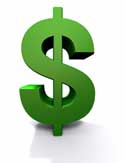
Fear of dollar collapse as Saudis decline to drop interest rates.
Saudi Arabia is facing inflation and does not want a low interest rate policy. Thus, for the first time ever, they will not follow the Fed and are refusing to cut rates. This could easily break the dollar currency peg and cause a mass stampede out of the dollar, something which would be disastrous to the U.S. economy.
So, you ask, why would the Fed deliberately crater the dollar? Mish, a registered investment advisor, says he know why.
The Fed is indeed “Hell Bent On Punishing Dollar Holders”. That is the plan. I have been telling people for months that the Fed does not give a hoot about the dollar.
The top three Fed concerns are as follows:
* Bailing out their banking buddies
* Bailing out their banking buddies
* Bailing out their banking buddies
Mish also says, and can document, that quite a few knew in advance what the Fed was going to do because the market started reacting just *before* the Fed announcement on Tuesday. Golly, how cozy.
The only way the Fed can save the dollar is to raise interest rates. But, given their rate cut, they are clearly putting the well-being of investment banks and hedge funds ahead of that of the country at large. The monied class protects its own.
As I wrote a couple of weeks ago, the Fed has an interesting dilemma: on the one hand, inflationary pressure remains high as a result of government hyperspending. On the other, the economy is in danger of recession. This mounting “stagflation” is the predictable result of the consistent Keynesian economic policy of the Bush administration’s policies of deficit spending and tax cuts.
So, does the Fed bolster the dollar and let heads toll in the employment sector? Or bolster the economy and let the dollar slide? As I pointed out two weeks ago, either way they are damned. There is no good move.
The fact is, a rate cut is friendly to the broader economy. While IMO 1/2% was too much, it was welcomed by businesses and business watchers (witness the rise in stocks). To say that the purpose of a rate cut was to bail out their banking buddies is to give the Fed far too little credit. In fact, this may hurt banks more than help them, since the value of the cash they hold is lessening by the minute.
Remember, the Fed (rightly) has only one tool to use, and that is manipulation of the interest rate. It’s hard to pin the housing bubble on them without postulating a much broader Fed role. Given competent leadership and sound economic policy in the executive branch, that one tool should be enough. (We’ve had neither for seven years.)
Many hedge funds and investment banks were getting killed by the narrowing spreads on their interest rate swaps (buy short-term, invest long-term) and by the tightening of the credit markets (which made it much harder to roll over the short-term loans). The Fed move was manna from heaven for them.
The rate cut will barely help those in danger of losing homes, it won’t help the crumbling housing market because the problem primarily is way too many houses are on the market with many more coming.
The stock market did have a fast pop. It won’t last.
At least one Fed governor warned Greenspan in 2001 about the bubble. He ignored them. Greenspan presided happily over two bubbles, bubbles he helped created and did little to stop, dot com and subprime.
Follow the money. Who got rich(er) off this? Who benefited the most? Hint: It wasn’t us. Conversely, who got hurt the most. Hint: It wasn’t investment banks and Wall Street.
Well, certainly none of us made money on Wall Street… Or in the housing market, where middle-class homeowners who bought and sold well tripled their wealth…
The rich will always make more money than the poor, and they’ll keep it unless it’s taken from them peacefully (through taxation) or otherwise. In times of war, times of peace, the Great Depression, the Tech Boom– the rich get richer. That’s no indication that what the Fed did was inherently bad for the broader economy. In fact, historically the Dow gains more under Dems than under Republicans.
But my question is this: how could interest rate manupulation by the Fed have prevented the tech bubble?
> how could interest rate manupulation by the Fed have prevented the tech bubble?
By raising the cost of borrowing money. By being a bully pulpit early on. Venture capital firms, and the investment banks who underwrote all those garbage IPOs made billions. Guess who got stuck with the bill?
“Guess who got stuck with the bill?”
Actually it was spread pretty well– plenty of the techies themselves went broke, while those savvy individual investors who heeded the (plentiful) warnings did well. (I didn’t.) Some of the investment bankers went to jail, others got gobbled up by their competitors. The ramifications to the larger economy were mainly from a sudden reduction of free cash among the newly rich (who became just as suddenly un-rich).
Sure there were plenty of individual stockholders who wanted to believe the gravy train would go on forever. It didn’t. As you so rightly pointed out in “Hedge fund math does not compute,” when an investment return seems to be too good to be true, it probably is.
One last thought: an economic bubble cannot form without willing buyers. If they be ignorant, let’s educate them. If they be greedy, well, that’s another problem entirely.
Mutual Funds and Market Research…
I couldn’t understand some parts of this article, but it sounds interesting…
The U.S. trade deficit widened in October, coming in above Wall Street’s expectations, as higher oil prices and a continued increase in Chinese imports fueled the gap, according to the government’s latest reading.